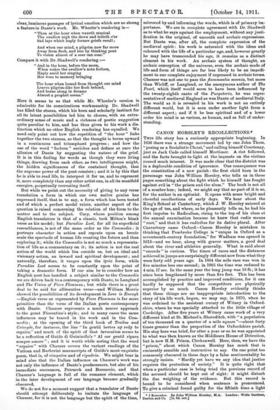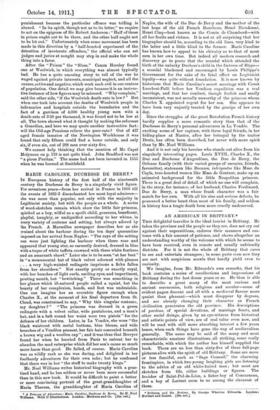CANON HORSLEY'S RECOLLECTIONS.*
THIS life story has a curiously appropriate beginning. In 1836 there was a strange movement led by one John Thom, "posing as a Socialistic Christ," and calling himself Courtenay, just as Jack Cade called himself Mortimer. A riot followed, and the facts brought to light at the inquests on the victims roused much interest. It was made clear that the district was in a deplorable condition of ignorance. One consequence was the constitution of a new parish : the first child born in the parsonage was John William Horsley, who tells Ili in these pages something about the fight which he himself has fought against evil in "the prison and the slum." The book is not all of a sombre hue; indeed, we might say that no part of it is so, for the author is an optimist. It opens with some bright and cheerful recollections of early days. We hear about the King's School at Canterbury, which J. W. Horsley entered at the age of ten, and where, as he pleasantly tells us, he had his first impulse to Radicalism, rising to the top of his class at the annual examination because he knew that radix means "root," and that it has radicibus for its dative pluraL After Canterbury came Oxford—Canon Horsley is mistaken in thinking that Pembroke College is "unique in Oxford as a seventeenth-century foundation," for Wadham was opened in 1613—and we bear, along with graver matters, a good deal about the river and athletics generally. What is said about "records" is curious. The times of races and the distances achieved in jumps are surprisingly different now from what they were forty odd years ago. In 1864 the mile race was won in five minutes less one second ; in 1905 the time was reduced to 4 mm. 17 sec. In the same year the long jump was 18 ft.; it has since been lengthened by more than five feet. This has been accomplished by practice and improved conditions, for it can hardly be supposed that the competitors are physically superior by so much. Canon Horsley evidently thinks that these things are no inappropriate introduction to the story of his life work, begun, we may say, in 1870, when he was ordained to the assistant curacy of Witney in Oxford- shire, where he was specially attached to the little village of Curdridge. After five years at Witney came work of a very different kind at St. Michael's, Shoreditch, with "a population of ten thousand on a quarter of a mile square "—about forty times greater than the proportion of the Oxfordshire parish. His stay here was brief, for after a year or so he was appointed to what was then known as the Middlesex House of Detention, but is now H.M. Prison, Clerkenwell. Here, then, we have the "prison," about which Canon Horsley has much that is eminently sensible and instructive to say. On one point too commonly obscured in these days by a false sentimentality he strongly insists. "Hardly yet have we any idea that justice requires the protection of society." It is quite right that when a particular case is being tried the previous record of the accused should be kept out of sight: it might disturb the due weighing of the tvidence. But this record is bound to be considered when sentence is pronounced. To give a criminal found guilty for the fiftieth time a light * I Remember. By John William Hensley, M.A. London ; Wells Gardner, Darton and Co. [7s. &I. net.]
punishment because the particular offence was trifling is absurd. "In its spirit, though not as to its letter," we require to act on the epigram of Sir Robert Anderson: "Half of those in prison ought not to be there, and the other half ought not to be let out." Unfortunately when some movement has been made in this direction by a "half-hearted experiment of the detention of inveterate offenders," the official who can set judges and juries at nought may step in and make the whole thing into a farce.
After the "Prison" the "Slum." Canon Horsley found one at Woolwich, in which everything was almost typically bad. He has a quite amusing story to tell of the war he waged against private interests, municipal neglect, and all the causes, active and negative, which work such evil in our centres of population. One detail we may give because it is an instruc- tive instance of how figures may be misused. "Why complain," said the other side, "if the Woolwich death-rate is low ?" But when one took into account the deaths of Woolwich people in infirmaries and hospitals outside the boundaries and the fact of a garrison of 4,000 healthy young men with a death-rate of 3-50 per thousand, it was found not to be low at all. The town showed what it thought by making the reformer a Guardian, and here we may quote another instructive fact : will the Old-age Pensions relieve the poor-rate Out of 437 aged female inmates of the Newington Workhouse it was found that only fifteen could find a home outside, and only six, if even six, out of 288 men over sixty-five.
We cannot help thinking that the mention of Mr. Capel Molyneux on p. 119 is not quite kind. John Bradford was not " a pious Puritan." The name had not been invented in 1555 when he was burned at Smithfield.



















































 Previous page
Previous page